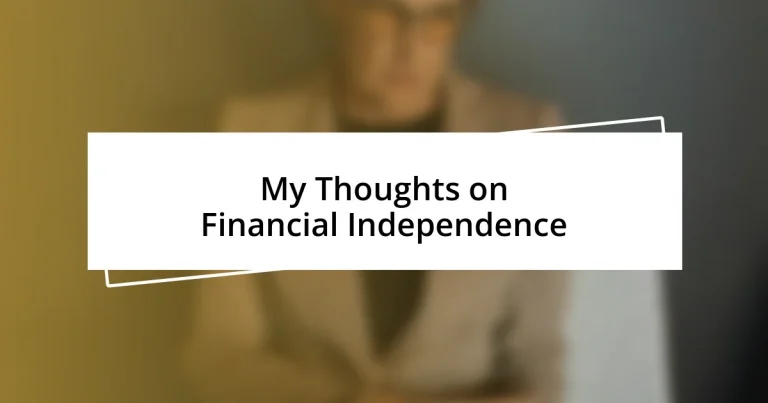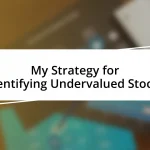Key takeaways:
- Financial independence is about achieving the ability to cover living expenses without traditional employment, allowing for personal freedom and choice.
- Setting realistic and flexible financial goals, along with developing a sustainable budget, is essential for navigating one’s financial journey effectively.
- Effective debt management and embracing community support contribute significantly to maintaining a lifestyle of financial independence and achieving long-term goals.
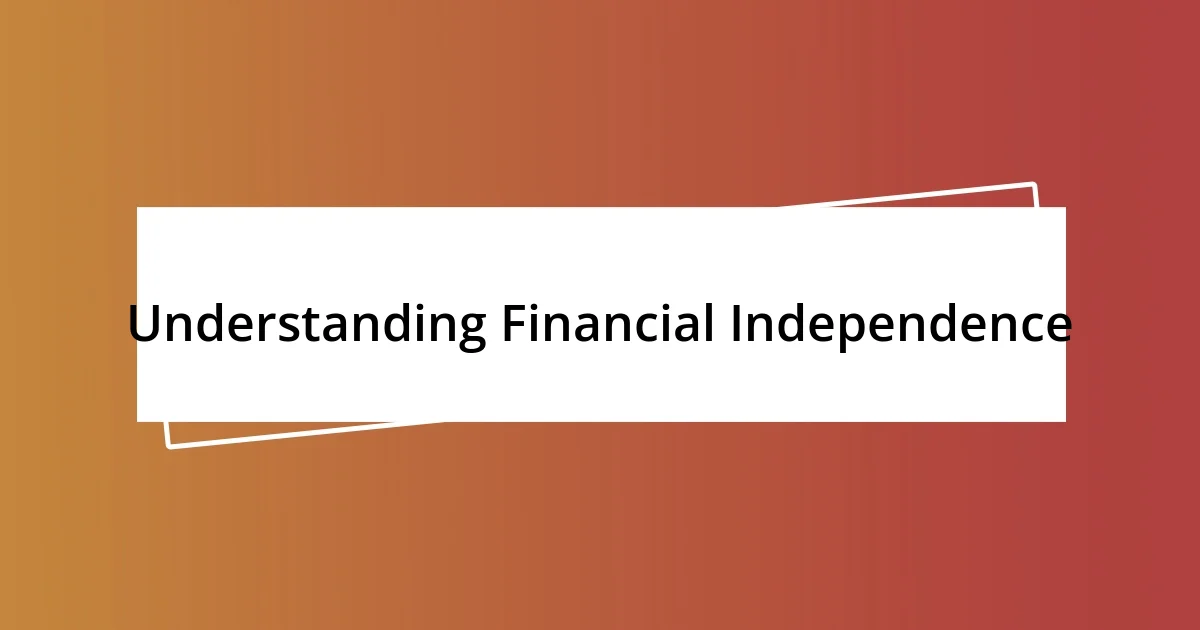
Understanding Financial Independence
Financial independence isn’t just a buzzword; it’s a personal journey that can transform your life. I remember the moment I realized it wasn’t only about having money but about gaining the freedom to make choices that align with my values. Can you imagine waking up each day knowing you have the power to pursue your passions without being tethered to a job solely for a paycheck?
To truly understand financial independence, we must recognize it as the ability to cover our living expenses without relying on traditional employment. Think about it—what would you do with your time if you weren’t tied to a 9-to-5? In my case, the thought of traveling, learning new skills, or simply enjoying quiet mornings at home without financial stress was liberating. This realization shifted my perspective and set me on a path to take control of my finances.
The emotional aspect of financial independence often gets overlooked, yet it’s a crucial part of the equation. I recall a time when I felt trapped in my financial situation, anxiously checking my bank balance at the end of each month. It was exhausting and anxiety-inducing. Now, the idea of having that peace of mind fuels my ambition and encourages me to make smarter financial choices. Isn’t that the kind of freedom we all crave?
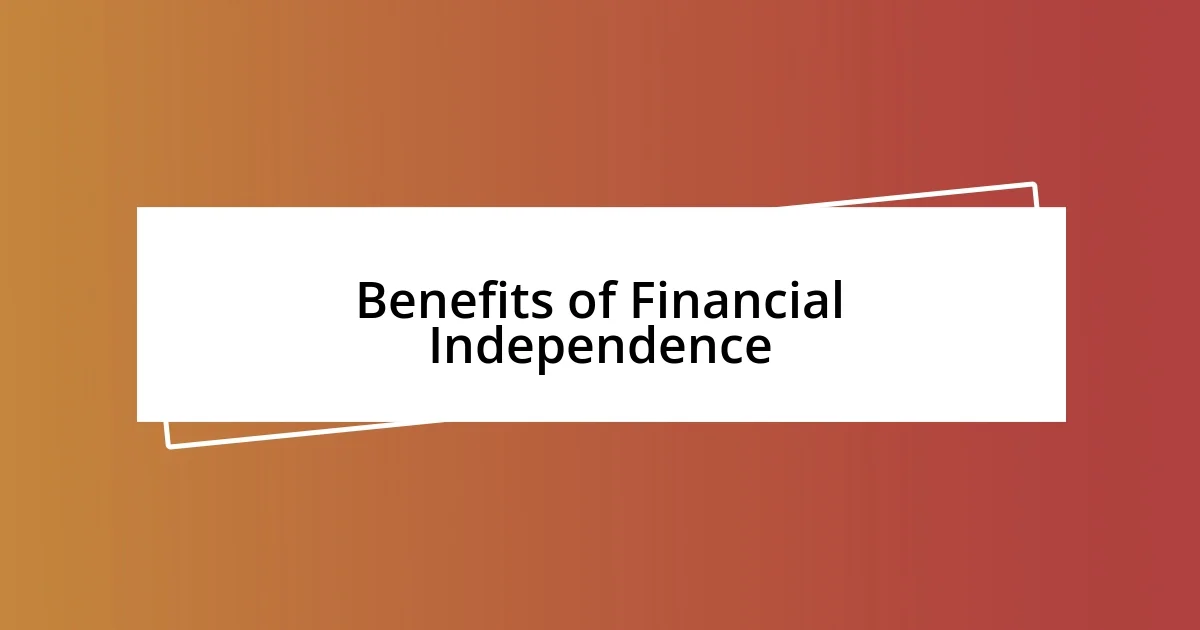
Benefits of Financial Independence
Achieving financial independence opens a world of possibilities that most people never consider. I often reflect on how this journey has allowed me to prioritize my well-being. Instead of living paycheck to paycheck, I’ve been able to invest in meaningful experiences—like attending workshops or indulging in hobbies that truly excite me. Having that flexibility feels like a treasure I never want to lose.
Here are some key benefits of financial independence:
- Flexibility: I can choose projects that inspire me instead of committing to something just for a paycheck.
- Reduced Stress: I no longer feel the weight of financial burdens impacting my mental health—what a relief!
- Empowerment: I’ve gained control over my decisions, allowing me to align my choices with my values.
- Opportunity: With more time and resources, I can explore passions I never had the chance to pursue before.
- Legacy: I now think about how I can build a foundation for the next generation, creating a lasting impact beyond my lifetime.
Each of these benefits contributes to a richer life experience, transforming how I approach every day.
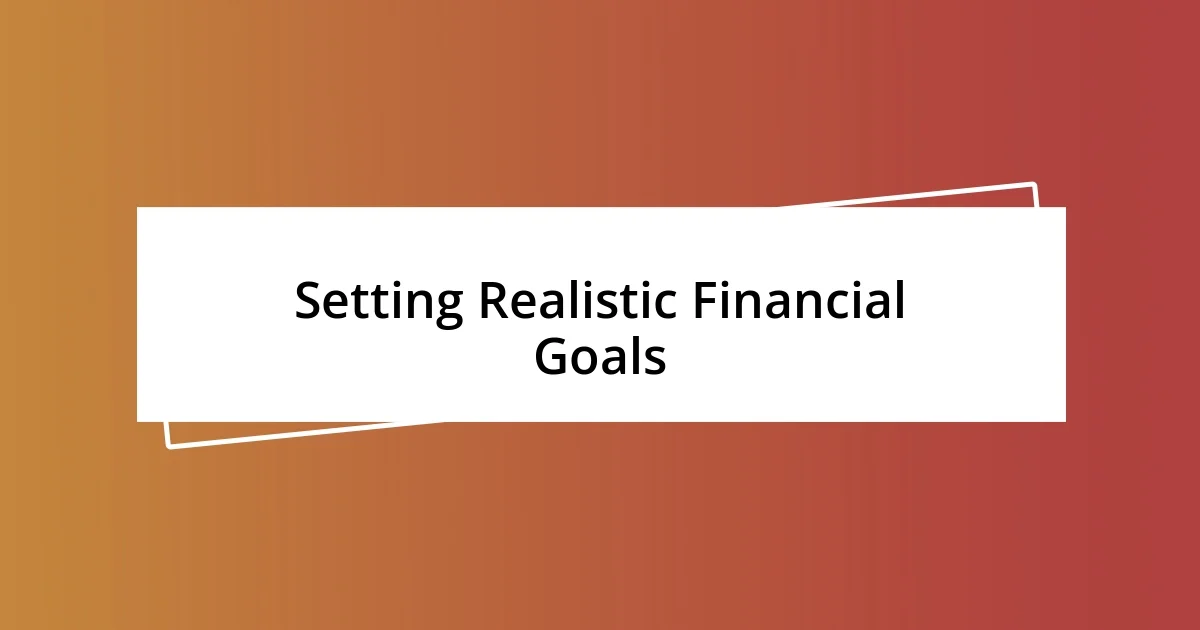
Setting Realistic Financial Goals
Setting financial goals that are realistic is pivotal in my journey toward financial independence. I usually start by breaking them down into short-term, medium-term, and long-term goals. For example, I once aimed to save for a vacation. Instead of just saying, “I want to save for travel,” I defined it as “I want to save $2,000 in the next year.” This clarity ignited my determination and made it much easier to plan my monthly budget. Have you ever noticed how specific goals can really motivate you to take action?
One of the most important lessons I’ve learned is the value of flexibility in your goals. Life is unpredictable, and sometimes, your circumstances can change overnight. I remember when a sudden car repair disrupted my savings plan. Instead of feeling defeated, I adjusted my short-term goal to include this necessary expense. It taught me that financial goals aren’t set in stone—they can evolve as your life does. This adaptability has significantly reduced my stress.
Setting realistic financial goals means understanding your current situation and being honest with yourself. When I first started budgeting, I was overly ambitious, aiming to save excessively without considering my lifestyle. It took me time to realize that setting attainable goals made a world of difference. For instance, instead of cutting all discretionary spending, I focused on reducing it by 20%. It was a more achievable target, and celebrating these small wins kept me motivated.
| Goal Type | Examples |
|---|---|
| Short-Term | Save for a vacation, build an emergency fund |
| Medium-Term | Pay off credit card debt, save for a car |
| Long-Term | Retirement savings, buying a house |
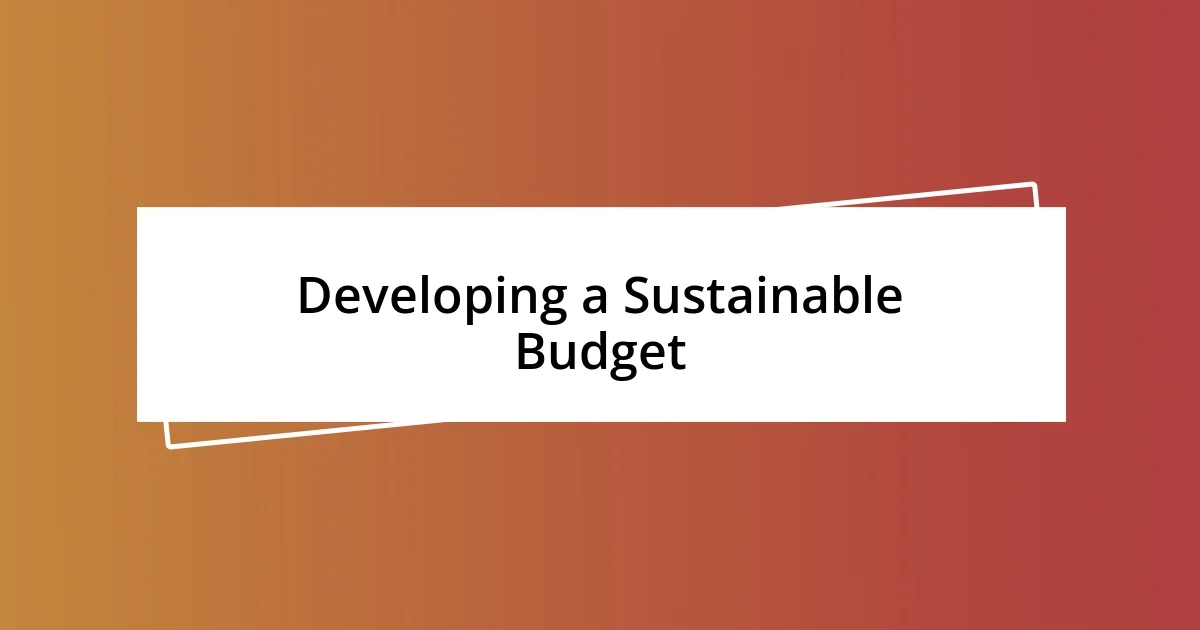
Developing a Sustainable Budget
Developing a sustainable budget is like crafting a roadmap for your financial journey. When I first tackled my budget, I felt a mix of excitement and anxiety. I started by tracking my expenses for a month, which was eye-opening. Have you ever been surprised by how much those little purchases add up? It’s often the small, daily choices that can lead to significant shifts in our financial landscape.
What I found most impactful was creating a category for discretionary spending that honored my passions. For example, I allocated a monthly budget for dining out and art supplies, both of which feed my soul. By intentionally setting aside money for things that matter, I not only kept my budget on track but also felt fulfilled. It made me realize that budgeting doesn’t mean deprivation—it’s about prioritizing what brings joy to your life.
Lastly, I learned the importance of revisiting my budget regularly. In the beginning, I thought once I set it up, I was done! But life has a way of throwing curveballs—unexpected expenses or even new opportunities to explore. I remember adjusting my budget after an impulse purchase turned into a passion for photography. By allowing myself the freedom to adapt, I’ve been able to maintain a sustainable budget that truly reflects who I am. How often do you revisit your financial plans to ensure they align with your evolving life? The more frequently I check in, the better I feel about my financial future.
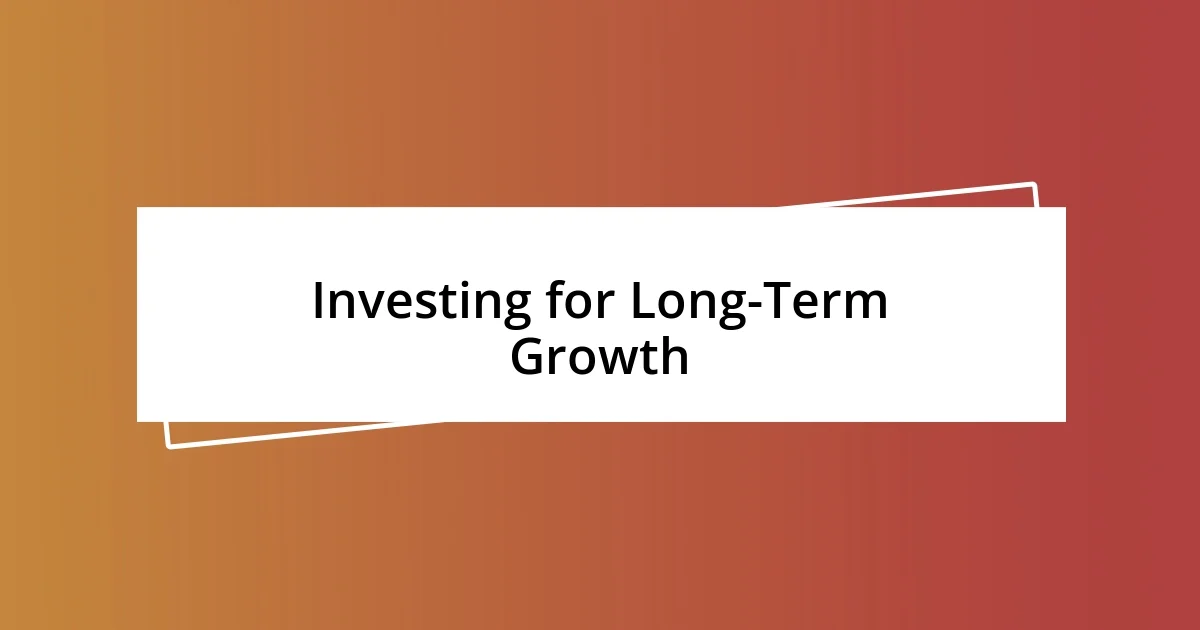
Investing for Long-Term Growth
Investing for long-term growth not only requires patience but also a keen understanding of market dynamics. I vividly remember when I made my first dive into the stock market. I felt a mix of excitement and fear. I invested in a company whose products I believed in, and over time, watching my investment grow was incredibly fulfilling. Have you ever experienced the thrill of seeing your money work for you? It’s empowering!
A strategy I’ve found invaluable is diversifying my portfolio. When I started, I put all my eggs in one basket, and honestly, that made me anxious. Losing a chunk of my investment taught me a crucial lesson about spreading risk. Now, I invest in a mix of stocks, bonds, and even real estate. This variety not only stabilizes my returns but also creates a safety net. How do you manage your investments to safeguard against volatility?
I’ve also learned the importance of staying informed about economic trends. Each year, I dedicate time to read financial articles and attend webinars. This knowledge allows me to make informed decisions rather than relying on gut feelings. Just last year, after reading about a tech innovation, I decided to pivot some of my investments into that sector. It’s amazing how being proactive about my financial education has opened doors for me. Have you ever considered investing in your own financial literacy? The more you know, the better your investments can grow.
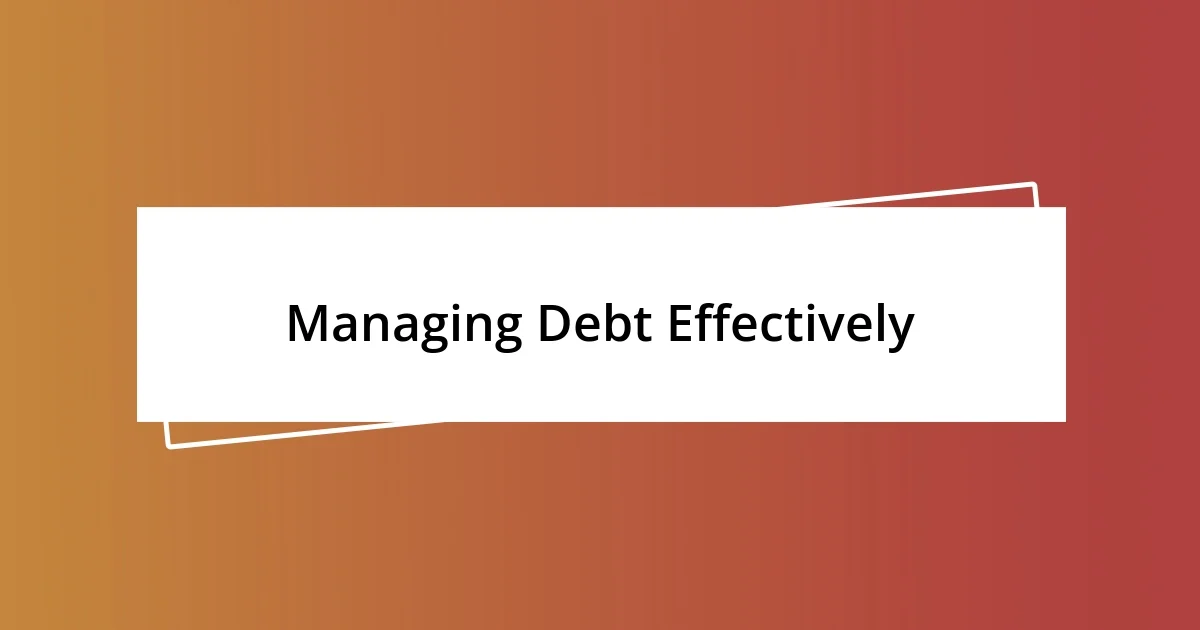
Managing Debt Effectively
Managing debt effectively is crucial for achieving financial independence, and I’ve learned that prioritizing high-interest debts is a game-changer. I recall the moment I tackled my credit card debt—a nagging weight off my shoulders. I focused on the card with the highest interest rate first, then snowballed those payments into my other debts. Have you ever felt that relief when you see your balance shrink? There’s an undeniable satisfaction in watching your financial burden lighten over time.
Creating a clear repayment plan can also make a significant difference. I remember when I mapped out my debts using a simple spreadsheet; it provided me with a visual representation of my financial journey. Not only did it help me set realistic goals, but it also motivated me to see progress. I could celebrate those small victories along the way, like paying off one debt, which kept me energized. How do you track your debt repayment? I found that accountability made my journey more manageable.
Lastly, I can’t stress enough how important it is to avoid accumulating new debt while trying to pay off existing balances. It’s tempting to use credit for convenience, but I learned the hard way that it could set me back significantly. I made a conscious choice to use cash for my discretionary purchases, which turned out to be an eye-opener. Have you ever noticed how tangible cash feels compared to swiping a card? When you physically hand over cash, it truly makes you reconsider that purchase! Small shifts like these have helped me manage my debt effectively and maintain my focus on financial independence.
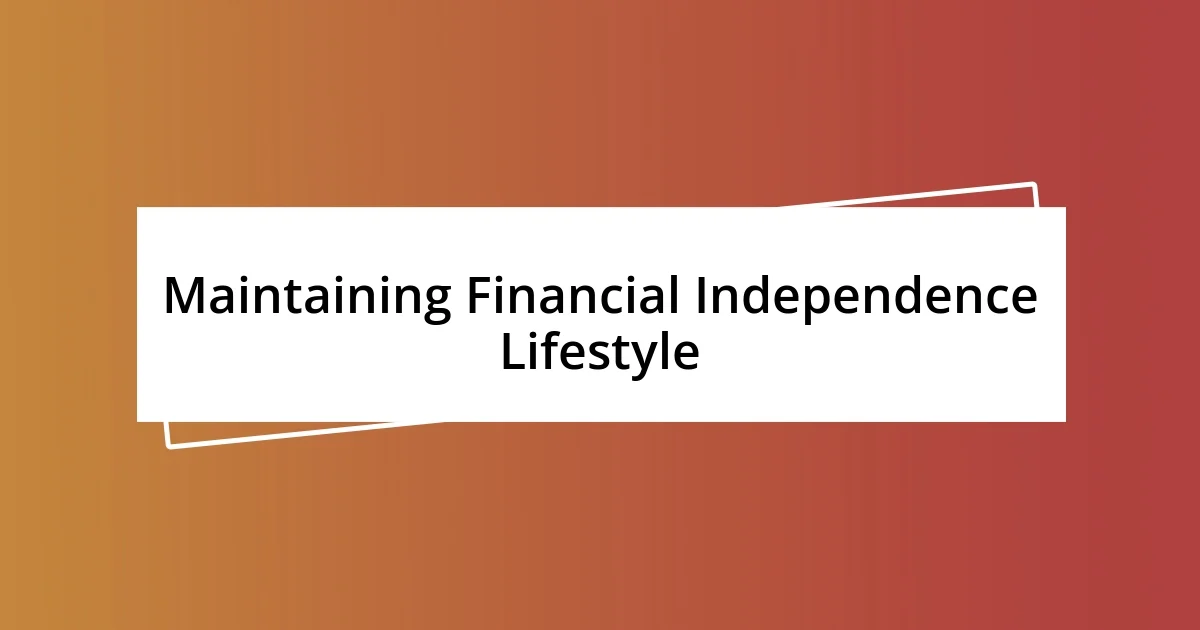
Maintaining Financial Independence Lifestyle
Maintaining a financial independence lifestyle is about building habits that support your long-term goals. One practice I adopted was tracking my monthly expenses, which initially felt tedious. However, I vividly remember the first time I recorded every little purchase—like that impulsive coffee run or those online shopping splurges. I was shocked at how quickly small expenses added up! Have you ever taken a good, hard look at where your money goes? It can be an eye-opening experience that helps you prioritize what’s truly important.
Another shift I made was to set up automated savings. When I transitioned to this approach, it felt like my savings grew effortlessly. I still recall that sense of accomplishment after setting up my accounts to automatically transfer a portion of my paycheck before I even had a chance to spend it. It’s like paying myself first. Do you automate your savings? This simple change reduced my anxiety around budgeting and gave me a sense of security knowing my future was being prepared for without conscious effort.
In addition to mindful spending and saving, I embraced the value of community. Surrounding myself with like-minded individuals who prioritize financial independence has been inspiring. I regularly join local meetups, and I remember discussing personal finance tips over coffee with friends. The emotional support and shared experiences have been invaluable. Have you found a community that encourages your financial goals? Sharing our wins and challenges creates a camaraderie that reinforces our commitment to maintaining a financially independent lifestyle.












